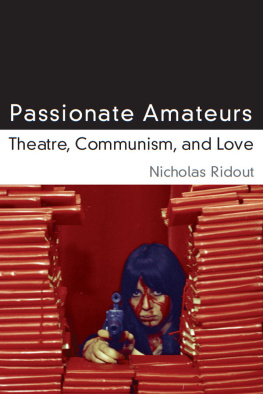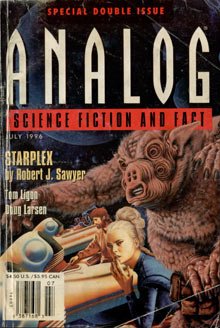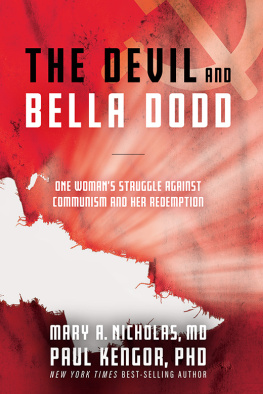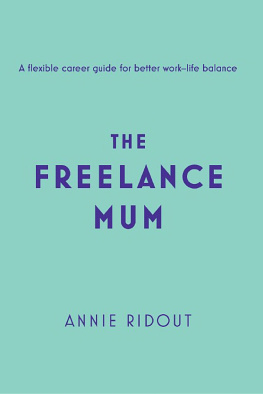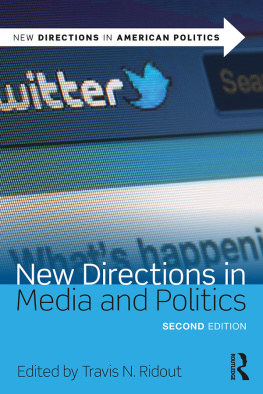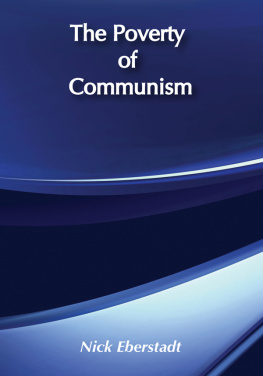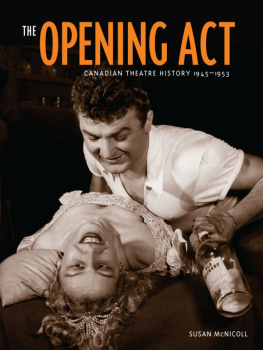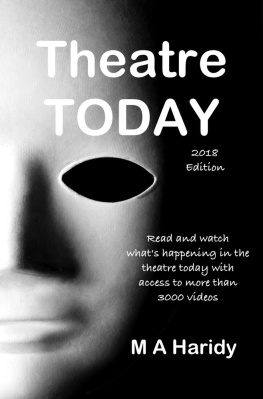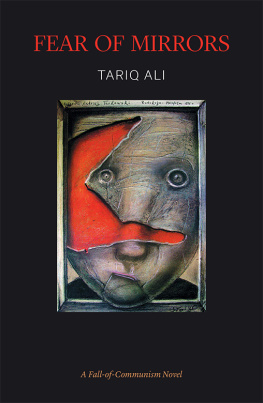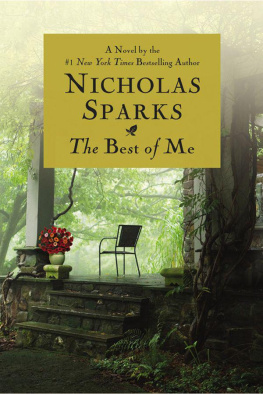Nicholas Ridout - Passionate Amateurs: Theatre, Communism, and Love
Here you can read online Nicholas Ridout - Passionate Amateurs: Theatre, Communism, and Love full text of the book (entire story) in english for free. Download pdf and epub, get meaning, cover and reviews about this ebook. year: 2018, publisher: The University of Michigan Press, genre: Politics. Description of the work, (preface) as well as reviews are available. Best literature library LitArk.com created for fans of good reading and offers a wide selection of genres:
Romance novel
Science fiction
Adventure
Detective
Science
History
Home and family
Prose
Art
Politics
Computer
Non-fiction
Religion
Business
Children
Humor
Choose a favorite category and find really read worthwhile books. Enjoy immersion in the world of imagination, feel the emotions of the characters or learn something new for yourself, make an fascinating discovery.
- Book:Passionate Amateurs: Theatre, Communism, and Love
- Author:
- Publisher:The University of Michigan Press
- Genre:
- Year:2018
- Rating:4 / 5
- Favourites:Add to favourites
- Your mark:
- 80
- 1
- 2
- 3
- 4
- 5
Passionate Amateurs: Theatre, Communism, and Love: summary, description and annotation
We offer to read an annotation, description, summary or preface (depends on what the author of the book "Passionate Amateurs: Theatre, Communism, and Love" wrote himself). If you haven't found the necessary information about the book — write in the comments, we will try to find it.
Passionate Amateurs: Theatre, Communism, and Love — read online for free the complete book (whole text) full work
Below is the text of the book, divided by pages. System saving the place of the last page read, allows you to conveniently read the book "Passionate Amateurs: Theatre, Communism, and Love" online for free, without having to search again every time where you left off. Put a bookmark, and you can go to the page where you finished reading at any time.
Font size:
Interval:
Bookmark:
We are sitting in the theatre, and we are worrying about community. We are not alone; much work has already preceded us in thinking about the relationship between our attendance at the theatre and our participation in both the social and the political dimensions of community. In this chapter my aim is to move between the first of the three terms with which this book announces itself to be concernedtheatreand the secondcommunism. Notwithstanding my own leap to a certain understanding of historical communism as part of the scope (or mythical content) of B.#03, the task of justifying communism, as such, as a central concern of this book will eventually come to depend upon a more familiar conjunction, that between theatre and community. For, as should be clear by now, this is not a book about a communist theatre. It seeks communism in a certain potentiality within theatrical practice rather than in any theatre that would name itself communist (even if the Proletarian Children's Theater of might lead one to think otherwise). Communism here is not the given name of a party, nor, least of all, of any national political state under which theatre might be produced and presented. The communism in question here remains to be found, in relation to the practice of theatre, or rather, as a potential relation within the practice of theatre.
What is the experience of relation in the practice of theatre that might offer communist potential? It will need to be distinguished both from a more general feeling that those who gather in a theatre might share a sense of community, and also from what Jill Dolan has called the utopian performative, in which participation in a live performance event produces a public among whom a sense of human potential beyond the constraints of the present is fleetingly captured.
Romantic anti-capitalism names a resistance to industrial capitalism, articulated on behalf of values, practices, and experiences, often those of a premodern, preindustrial, rural life, that industrial capitalism seemed determined to destroy. Because of its valorization of premodern conceptions of community and social relations, it has frequently been characterizedalong with romanticism more broadlyas a conservative or politically retrograde tendency in critical thought. Many Marxists, in particular, especially those for whom a progressive model of historical development is a crucial dimension of their political analysis, have regarded Page 7 the romantic anti-capitalist with great suspicion. Indeed, the first elaboration of the term romantic anti-capitalist is usually attributed to the Hungarian Marxist, Gyrgy Lukcs, for whom it described the sensibility or worldview of writers such as Dostoevsky, whose work contains an only partly articulated vision of community as a world beyond estrangement and which therefore falls short of an adequate materialist critique of capitalism.
Among the key characteristics of romantic anti-capitalism are that its expressions of rebellion and its articulations of critique are directed against the damage wrought by industrial capitalism upon human individuals and communities from a perspective shaped by a deeply felt attachment to a mythical or imaginary precapitalist past: Romanticism issues from a revolt against a concrete historical present. What is rejected, in other words, is not the present in the abstract but a specifically capitalist present conceived in terms of its most important defining qualities. The most important of capitalism's defining qualities is its organization of all human life around wage labor, in which human activity and creative Page 8 capacity are primarily valued for what they can contribute to the accumulation of capital, and in which life is measured out in units of productive time.
The precapitalist pastthe world before wage labor became the dominant work-relationtakes a number of forms and throws up a diversity of mythical antecedents as images of revolt or an alternative society. For many German, and indeed English participants in this tradition (like William Morris), heroic fantasies of a highly aestheticized medieval period proved especially appealing. For Bloch, the sixteenth-century radical Protestant leader Thomas Mnzer became an exemplary figure. Others, including Lukcs, Engels, and, at times, Marx himself, looked either to democratic Athens or to the Homeric era's primitive communism for metaphorical and ideological resourcesa preference that a number of theatre makers and scholars almost inevitably share. Michael Lwy, returning to the theme of romantic anti-capitalism in a recent study of Walter Benjamin's Theses on the Concept of History, makes a crucial observation about the nature of this kind of use of the past. It does not involve a desire that history should go into reverse, but rather the idea that a genuinely revolutionary move might involve something that theatre does rather wellan interruption or substitution of the present with something of the past, something consciously and deliberately repeated:
One might define the Romantic Weltanschauung as a cultural critique of modern (capitalist) civilization in the name of pre-modern (pre-capitalist) valuesa critique or protest that bears upon aspects which are felt to be unbearable and degrading: the quantification and mechanization of life, the reification of social relations, the dissolution of the community and the disenchantment of the world. Its nostalgia for the past does not mean it is necessarily retrograde: the Romantic view of the world may assume both reactionary and revolutionary forms. For revolutionary Romanticism the aim is not a return to the past, but a detour through the past on the way to a utopian future.
I want to suggest that theatre can perform this detour in two ways. First, it can offer an image or enactment or repetition of some aspect of the pastor, indeed, any time that is not the time of the present that the time of theatrical presence replacesin order to negate something of our present reality. Second, within the social and economic structure of industrial capitalism, it offers this negation of the present by way of an Page 9 experience that is not normally experienced as work, but as some kind of nonwork or play. Of course it is no such thing: it is work for those who make it, just as the nonpresent past or future summoned into the present by the act of theatre-making is also no such thing, but rather the present itself, experienced otherwise. The detour taken through the theatre leads through a past that is not past and is accomplished through work that looks like it is not work. This is why the theatre is a particularly good place for the passionate amateur or romantic anti-capitalist who wants to find some way of undoing, even if only for a moment, the time of her work and the work of time upon herself.
The theatre is also a good (because perverse) place to go looking for communist potentialnot, crucially, because it offers any kind of space beyond or outside capitalism, but precisely because it usually nestles so deeply inside it. Much romantic anti-capitalism looks to the past because it offers an image of an outside upon which a future utopia might be modeled. In the same gesture it also assumes that there exists some essential, whole, and unalienated humanity, from which capitalism has torn us and to which we may one day return through a restoration of past experiences and practices of community. This is the romance of community against which Miranda Joseph offers a powerful critique. For Joseph community is best understood, not as some alternative to capitalism in which human beings will realize themselves and their social relations most fully, but rather, as its supplement. It is a resource that lies within capitalism, and upon which capitalist projects and enterprises of many different kinds can draw in order to encourage the performance of subjectivities that will assist them in the production and realization of surplus value. It is not available, therefore, as an unproblematic source of alternative value and good feeling for left or liberal social and political projects. But nor is it merely an unattainable fantasy from which it would be better if everyone abstained. As Joseph writes, just once or twice, the true name of this supplement or specter is communism: a potential for the making of a life beyond the division of labor right where the division of labor rules. It was partly by accident that the personal experience that seems most richly to inform Joseph's critique was that of working as a volunteer in a nonprofit theatre in San Francisco. But it was a happy accident, not least for the present project, for which one of theatre's most significant characteristics is that the division of labor is not just visible there, but, literally, on show, night after night, right where people go looking for something very different. It is in this apparent contradictionand it is a contradiction that opens up only the very tightest of spacesthat the communist potential Page 10 of theatre might be found. If you can make it here, you can make it anywhere.
Next pageFont size:
Interval:
Bookmark:
Similar books «Passionate Amateurs: Theatre, Communism, and Love»
Look at similar books to Passionate Amateurs: Theatre, Communism, and Love. We have selected literature similar in name and meaning in the hope of providing readers with more options to find new, interesting, not yet read works.
Discussion, reviews of the book Passionate Amateurs: Theatre, Communism, and Love and just readers' own opinions. Leave your comments, write what you think about the work, its meaning or the main characters. Specify what exactly you liked and what you didn't like, and why you think so.

